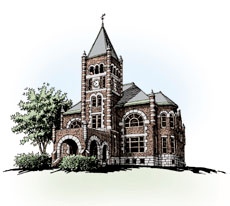 |
 |
| current issue |  |
past issues |  |
send a letter/news |  |
address update |  |
advertise |  |
about us |  |
alumni home |
The View from T-Hall
Centers of ExcellencesBy President Ann Weaver Hart

Professional and research centers and institutes play a critical part in the University of New Hampshire's research and engagement missions. The research that is conducted within these centers is not always visible to many friends of UNH, so I would like to highlight some of that exceptional work in this issue of the University of New Hampshire Magazine.
When the Institute for the Study of Earth, Oceans, and Space (EOS) was established in 1985, it was a small program with a tremendous vision. Conceived as a multidisciplinary scientific research center dedicated to the study of the relationship of the Earth with its surrounding universe, EOS relied on the commitment and passion of faculty members who understood what could be accomplished by pooling their intellectual capital. Today, EOS is a model for UNH and a world-class center of research and scholarship. A leader in its field, EOS supports inquiry at the highest levels by individuals at the top of their discipline. It draws some $28 million in external funding annually and is adept at communicating what it learns with the outside world.
I recently had the privilege of sharing the podium with our good friends and supporters, U.S. Sen. Judd Gregg and Vice Admiral Conrad Lautenbacher Jr., undersecretary of commerce for Oceans and Atmosphere and NOAA administrator, to announce UNH's participation in the world's largest-ever air quality study. This five-year, $9 million research effort is a landmark in the study of worldwide air quality and air quality prediction. The work in the state, across the Atlantic and in Europe will involve hundreds of scientists. Perhaps the best part is that our students will be deeply involved, working side by side with world-renowned scientists.
Such opportunities are a highly prized facet of a UNH education that combines the living and learning environment of a small New England liberal arts college with the breadth, spirit of discovery and civic commitment of a land-grant research institution. But knowledge remains academic unless we are equally committed to using what we learn to address the needs of our wider society. In fact, the fulfillment of our mission--teaching, research and public service--depends upon such activity.
In our Academic Plan, the strategic blueprint for the university, one of our goals is the advancement and coordination of engagement, outreach and public service efforts. Some of these programs are already in place. For example, the Joan and James Leitzel Center for Mathematics, Science, and Engineering Education is dedicated to improving education in these fields from kindergarten through college. In this, the center engages the university's working scientists, mathematicians and engineers as well as educators.
Our other centers also successfully link knowledge and application for the greater good. The Carsey Institute for Families and Communities is our newest interdisciplinary institute. Established with a gift from noted alumna Marcy Carsey '66, and led by Cynthia "Mil" Duncan, the institute is poised to become nationally influential. Faculty members and students from the College of Liberal Arts and the School of Health and Human Services will work together on research and scholarship to affect policy and inform policymakers on issues relating to families and communities. The synergy that will result from linking the important work at our Institute on Disability, Center for Health Policy and Practice, JusticeWorks and the Center on Integrated Regional Policy, to name a few, will work to our collective benefit.
Describing her vision for the institute, Duncan captures the promise of engagement through research and scholarship. "Carsey is going to be a lively place, where important projects are undertaken, where faculty members find new colleagues and ways of working, and where students are immersed in important issues of the day. It will be a place that town planners, state health officials and legislators can turn to for solid data and analysis, and where organizations can find students and faculty members ready to assist in examining problems and finding solutions. We want it to be like its sister, EOS, a university institute that attracts significant research funding to answer pressing social and health policy questions, and is a magnet to attract and hold the very best faculty and students."
This is truly the vision of discovery that drives our faculty members and students to the highest pursuit of excellence. ~
blog comments powered by Disqus

